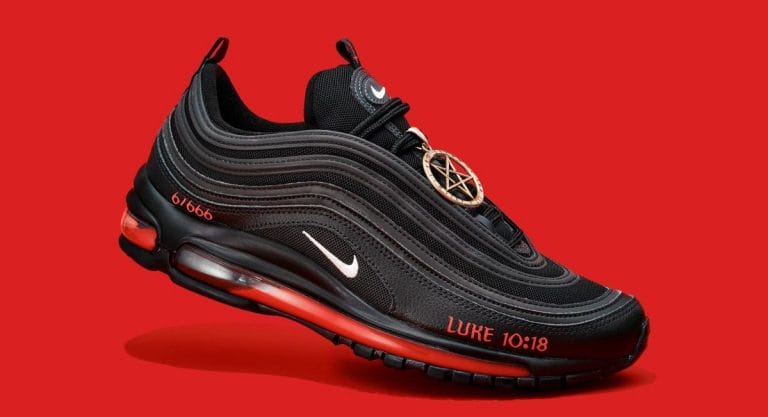
Categories

This article is authored by WLJ Tech Law attorney Brandon Middleton.
If you have been on Facebook, Twitter, TikTok the Internet recently, you’ve probably seen the uproar about the blood-infused “Satan Shoes” offered by MSCHF in collaboration with Lil Nas X, who just dropped his music video for the now hit song Montero (Call Me By Your Name). The shoes, which are now sold out, are customized Nike Air Max 97 shoes that feature a satanic theme and also prominently feature the well-known Nike swoosh.
Following calls of boycotts by unhappy consumers, Nike, alleging that the shoes were made by MSCHF without Nike’s approval or authorization, has filed a lawsuit claiming trademark infringement and dilution, false designation of origin and unfair competition. While this case is in its early stages and the outcome is unknown, the lawsuit outlines potential claims and strategies businesses have in protecting their brand and reputation with consumers.
Trademark Infringement
Trademark infringement claims can be simplified by asking a single question: is the challenged mark likely to cause confusion with a protected mark in the minds of the relevant consumers? In other words, if the use of the challenged mark is allowed, would consumers be likely to (incorrectly) believe the products or services offered in connection with the challenged mark come from the same source as a protected mark.
The idea behind disallowing use of a mark that is likely to cause consumer confusion is two-fold: (1) it is important to protect the efforts of the business (both in time and money) in building and maintaining a brand that is recognizable by consumers and that is known to indicate quality goods and services and (2) it is important to protect the expectations of the consumers who expect the certain quality of goods and services they have come to know for a particular brand. Without this type of avenue for brand protection, an infringer, by the use of a confusing mark, could cause both harm to a business and to consumers by damaging the goodwill the business has built with those consumers.
How does a court determine if a challenged mark is likely to cause confusion with a protected mark? It must examine a number of factors, known as the du Pont factors from a court case by the same name, with the two most impactful factors being (a) how similar or dissimilar is the challenged mark from the protected mark and (b) how closely related are the goods and services associated with the marks. And, generally, the more similar the marks the less related the goods/services need to be, and vice versa. The rationale is that when similar marks are used on similar goods/services, consumers are likely to believe that the goods or services all come from a single source.
Nike’s lawsuit asserts that MSCHF’s inclusion of Nike’s protected mark on the Satan Shoes is likely to confuse consumers as to the source of those products—that is, Nike says that consumers will see Nike’s marks on the shoes and likely believe that the shoes are sold by, endorsed by, sponsored by or otherwise connected to Nike.
Trademark Dilution
Claims of trademark dilution, like claims of infringement, are used to protect the brand and reputation of a business. Unlike trademark infringement, where confusion is central to the claim, trademark dilution claims are based on protecting the reputation of a widely recognizable, famous trademark and do not require a likelihood of confusion. In other words, while trademark infringement is about protecting the product/service expectations derived from a company’s goodwill, trademark dilution is about protecting the impact of that goodwill.
Dilution claims allow the owner of a famous mark to argue that the use of the same or sufficiently similar mark by another would reduce or be likely to reduce the public’s perception of that famous mark. Claims of dilution by blurring allege that the distinctiveness of the famous mark is impaired by the other’s use of a similar mark. Claims of dilution by tarnishment allege that the reputation associated with the famous mark is harmed through the other’s use of the same or similar mark. Of note, dilution claims are only possible when the protected mark is famous, but if successful, the owner of the famous mark is entitled to an injunction against the user of the challenged mark regardless of whether there is any confusion, competition or actual economic injury.
Nike’s lawsuit alleges that its marks have become famous as a result of the duration, extent, and geographic reach of advertising and publicity using Nike’s marks; the amount, volume and geographical extent of Nike’s sales and trading areas using Nike’s marks; the degree of recognition of Nike’s marks; and Nike’s registration and enforcement of its marks.
False Designation of Origin & Unfair Competition
Allegations of false designation of origin and unfair competition arise when a person uses in commerce a word, symbol, false designation of origin, or false or misleading description or representation of fact that is likely to cause confusion as to the origin, sponsorship or approval of its goods/services by another or that misrepresents the nature, characteristics, qualities or geographic origin of the goods/services or of another. In many cases, claims of false designation of origin and unfair competition may arise from the same facts as a claim for trademark infringement if a trademark is used in a way which creates a false designation of origin or a false or misleading description or representation of fact.
In the case of the Satan Shoes, Nike argues that MSCHF’s use of the Nike marks (including the prominently displayed Nike swoosh on the shoes themselves) is likely to cause confusion, mistake or deception as to Nike’s sponsorship or approval of the shoes. Nike, of course, shows various screenshots from the Internet of consumers threatening to boycott Nike over the shoes.
Lessons For Your Business
Your brand reputation is one of the most important parts of your business. It’s how your consumers see your business and how they see your products/services. Nike has spent many decades and many dollars building its brand by using its recognizable marks in national and global marketing campaigns and by building a trademark portfolio that is central to the infringement, dilution and unfair competition claims in the Satan Shoes lawsuit.
While your trademark portfolio might not be as large as Nike’s (Nike has hundreds of federally registered trademarks in the U.S. alone), taking brand protection seriously is just as important for your business. Seeking a federal registration for your marks gives you broad federal protection of your brand, allowing you to enforce your marks against those who may cause harm to your reputation by using a confusingly similar mark. Likewise, brand development through the continuous and exclusive use of your mark, particularly as your business continues to grow, sets the foundation for building a famous brand that opens the option to protect your brand through dilution claims.
Protecting your brand is protecting who you are. Trademark protection might seem simple at first, but without a proper trademark strategy, the door is open for others to limit your growth and limit your success. The devil is truly in the details.










































































